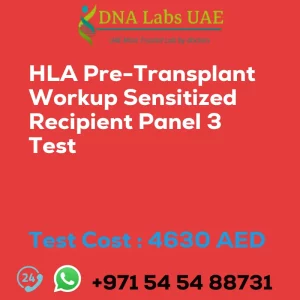HLA – PANEL REACTIVE IgG ANTIBODIES PRA CLASS I QUANTITATIVE Test
Test Cost: AED 2460.0
Symptoms and Diagnosis
The HLA – Panel Reactive IgG Antibodies (PRA) Class I Quantitative Test is a laboratory test used to assess the presence and level of IgG antibodies against human leukocyte antigens (HLA) in a patient’s blood. HLA molecules are found on the surface of cells and are responsible for immune recognition and regulation. The presence of antibodies against HLA can indicate a potential risk for organ transplant rejection, as these antibodies can bind to the HLA molecules on the transplanted organ and trigger an immune response.
Test Components
- Price: AED 2460.0
- Sample Condition: 3 mL (1.5 mL min.) serum from 1 SST. Ship refrigerated or frozen. Collect specimen preferably 48 hours after dialysis. Provide brief clinical history.
- Report Delivery: 10-12 days
- Method: Luminex X-Map technology
- Test Type: Transplantation
- Doctor: Nephrologist, Gastroenterologist, Hematologist
- Test Department: Pre Test Information
Test Details
During the HLA – Panel Reactive IgG Antibodies (PRA) Class I Quantitative Test, the patient’s serum is mixed with a panel of HLA antigens. If the patient has antibodies against any of the HLA antigens in the panel, the antibodies will bind to the antigens. The bound antibodies are then detected using an anti-IgG antibody labeled with a marker, such as fluorescent dye or enzyme. The test provides a quantitative measurement of the level of IgG antibodies against HLA class I antigens.
A higher PRA value indicates a higher percentage of antibodies present in the patient’s blood, which may increase the risk of organ transplant rejection. The HLA – Panel Reactive IgG Antibodies (PRA) Class I Quantitative Test is commonly used in pre-transplant evaluations to assess the compatibility between the donor and recipient. It helps determine the level of sensitization of the recipient and guides the selection of a suitable donor for organ transplantation.
| Test Name | HLA – PANEL REACTIVE IgG ANTIBODIES PRA CLASS I QUANTITATIVE Test |
|---|---|
| Components | |
| Price | 2460.0 AED |
| Sample Condition | 3 mL (1.5 mL min.) serum from 1 SST. Ship refrigerated or frozen. Collect specimen preferably 48 hours after dialysis. Provide brief clinical history. |
| Report Delivery | 10-12 days |
| Method | Luminex X-Map technology |
| Test type | Transplantation |
| Doctor | Nephrologist, Gastroenterologist, Hematologist |
| Test Department: | |
| Pre Test Information | Collect specimen preferably 48 hours after dialysis. Provide brief clinical history. |
| Test Details |
The HLA – Panel Reactive IgG Antibodies (PRA) Class I Quantitative Test is a laboratory test used to assess the presence and level of IgG antibodies against human leukocyte antigens (HLA) in a patient’s blood. HLA molecules are found on the surface of cells and are responsible for immune recognition and regulation. The presence of antibodies against HLA can indicate a potential risk for organ transplant rejection, as these antibodies can bind to the HLA molecules on the transplanted organ and trigger an immune response. During the test, the patient’s serum is mixed with a panel of HLA antigens. If the patient has antibodies against any of the HLA antigens in the panel, the antibodies will bind to the antigens. The bound antibodies are then detected using an anti-IgG antibody labeled with a marker, such as fluorescent dye or enzyme. The test provides a quantitative measurement of the level of IgG antibodies against HLA class I antigens. A higher PRA value indicates a higher percentage of antibodies present in the patient’s blood, which may increase the risk of organ transplant rejection. The HLA – Panel Reactive IgG Antibodies (PRA) Class I Quantitative Test is commonly used in pre-transplant evaluations to assess the compatibility between the donor and recipient. It helps determine the level of sensitization of the recipient and guides the selection of a suitable donor for organ transplantation. |







